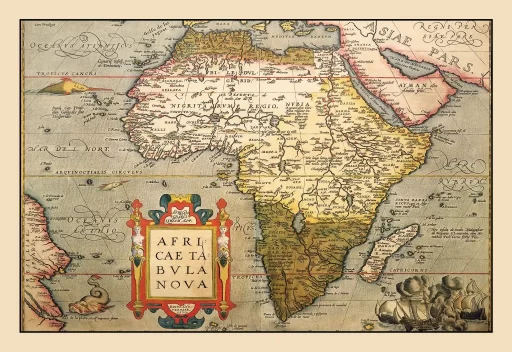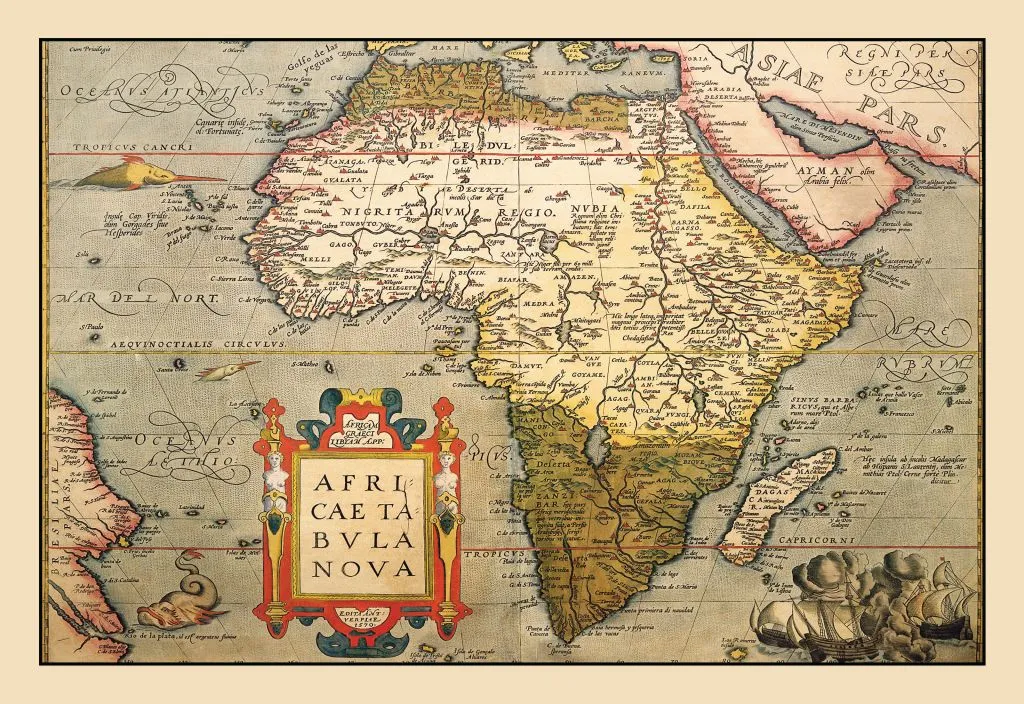Map of Africa circa 1602. | Source: Buyenlarge / Getty
Should African people be called black – or is the categorizing of people by skin color a racist practice? How about Africa? Is the name of the continent a racial slur because it was chosen by European exploiters and based on the weather rather than the people – and should it be renamed?
These are questions that African philosophy scholar Jonathan Okeke Chimakonam considers in a research paper. We asked him what he and his co-author concluded.
Who named Africa and what does the name mean?
The name Africa was given to the continent by European exploiters, slavers and colonists who first arrived as traders and explorers in the 1400s. “Africa” is believed to be taken from the Greek aphrike, meaning without cold; it translates in Latin to aprica, meaning sunny.
You know how it is. Humans habitually give names to strangers or new places they encounter. This is usually to enable them to identify such people or places. But history also shows that such names are often not pleasant because of the unhealthy spirit of competition that naturally characterizes such new encounters.
In fact, in many cases, the names are slurs aimed at demeaning such people or places. For example, we learn from the ancient Greek poet Homer’s accounts that when the Greeks first encountered the people of East Africa, they called them aethiops or Aithiops, meaning sun-burnt face. The ancient Jews referred to people of other nations and faith as gentiles, which was a slur that targeted them as outsiders. The ancient Chinese referred to people from Mongolia as barbarians, and the list goes on.
Sometimes, the slur does not target the people directly – for example, when the culture and peoples of the continent are ignored in naming, like Africa or South Africa. Aphrike refers to the climate; South Africa refers to the geography. What the two examples have in common is their silence about the inhabitants, their culture and accomplishments. This implies the history of the place began with the namer, as if it were uninhabited before the namer arrived.
Is the name Africa a racial slur?
Naming is a tool we use to identify objects and make sense of the world around us. To this extent, it’s a good and powerful thing. The problem is when some people decide to weaponize it, such as using slurs to denigrate others. Slavery, colonialism and racialized ideologies like apartheid in South Africa remain some of the worst weaponization of naming through slurs.
My co-author and I argue in our paper that the name Africa is a racial slur. Aphrike or aprica refers to the hot climate of the continent, perhaps in exaggeration, with the false impression that the continent is “without cold”. If the continent is hot and without cold, that would make it the proverbial hell fire, would it not?
Look at the meaning of aethiops. Here, the people found on the continent named sunny or without cold became people with sun-burnt faces. The inference is that the unforgiving sun burnt the skin of the inhabitants. When something is burnt or charred, we call it black.
Any wonder why the defenders of scientific racism in some European universities in the 1700s and 1800s, especially at the University of Göttingen, Germany, decided to categorize the indigenous African peoples with the color black, the American Indian with red, some Asian peoples with brown, others with yellow, and the European with white?
We argue that these are various levels of degeneration except for white, which is unspoilt, pure and spotless. In our view, identifying a human being with any colors at all is racist. To identify as white is to discount others as non-whites, which is indirect racism, and to call someone by any other color – like black – is a direct racial subordination.
The essence of the project of color categorization of humanity was to establish racial hierarchy as part of an attempt to defend scientific racism and justify slavery, colonial oppression and exploitation.
You argue for Africa’s name to be changed?
Oh yes, we do. We believe it’s a terrible thing for an entire continent to be called by a slur. A good number of countries in Africa, like Zambia (Northern Rhodesia), Zimbabwe (Southern Rhodesia), Burkina Faso (Upper Volta), Ghana (Gold Coast), changed their names after political independence because they were slurs that demeaned their culture and denied their accomplishments as civilisations.
We argue that is what the continent should do too. It is even more pertinent because the name Africa has some really terrible cognates (names that have the same or similar nature) like aethiops and black (negro), which are the bedrock of modern anti-African racial segregation in America, apartheid in South Africa, and continuing racial subjugation elsewhere around the world.
In our research article we proposed thinking of a name like Anaesia – derived from two Igbo-African words, ana and esi, meaning land or place of origin – as a replacement for the name Africa. A name like Anaesia speaks to the facts of history about the continent as the first home of all humans and where the first human language was spoken.
Jonathan O. Chimakonam, Associate professor, University of Pretoria
This article is republished from The Conversation under a Creative Commons license. Read the original article.
The Conversation
SEE ALSO:
Mpox Questions Answered As Virus Sweeping Across Africa Is Declared A Global Health Emergency
‘NFL Africa’ Super Bowl Commercial Prompts Mixed Responses To League With No Black Majority Owners






